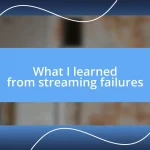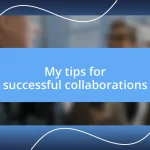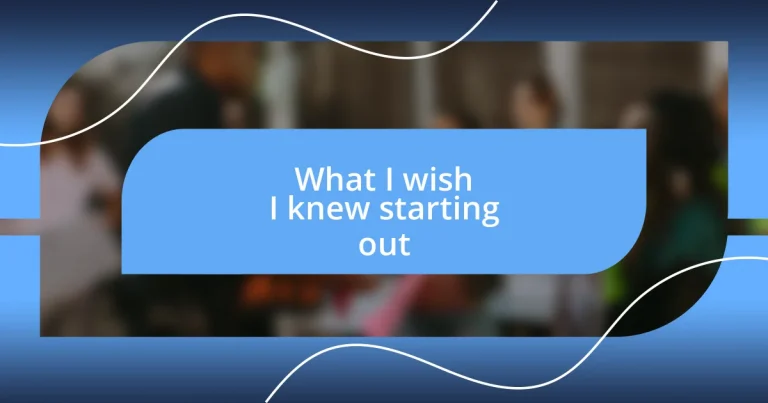Key takeaways:
- Effective communication, time management, and adaptability are essential skills for success in any journey.
- Avoiding common mistakes like rushing decisions, ignoring feedback, and neglecting networking can significantly enhance your career experience.
- Setting clear goals, maintaining motivation through celebrating small wins, and fostering a continuous learning mindset are crucial for personal and professional growth.
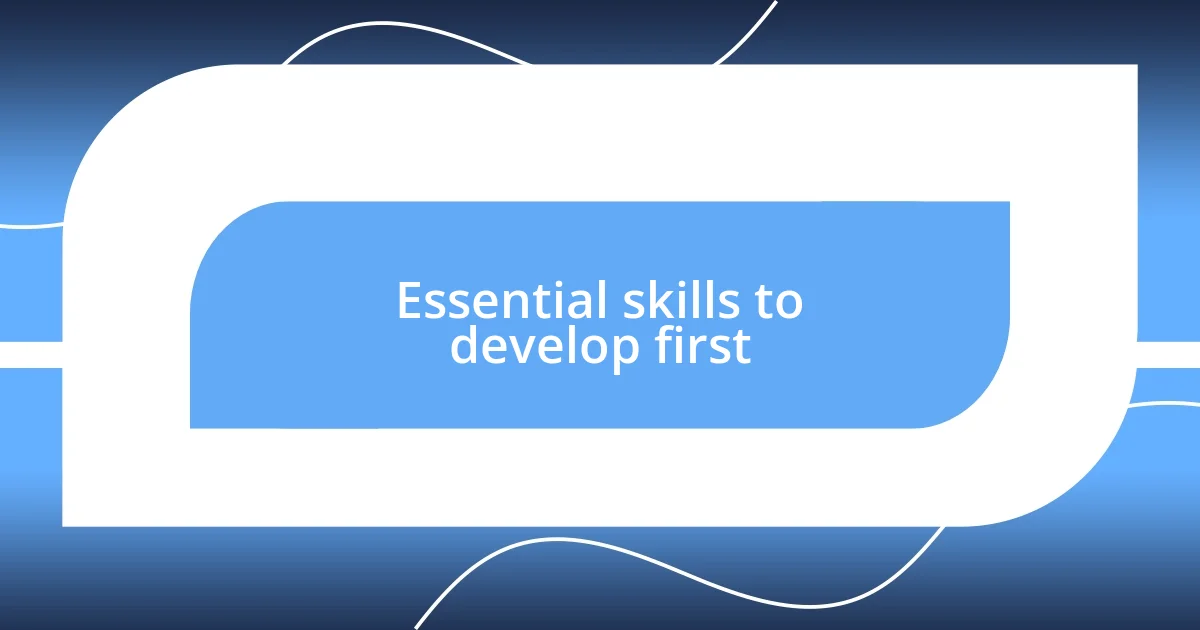
Essential skills to develop first
When I first started my journey, I quickly realized that effective communication was paramount. I remember a project where miscommunication led to a last-minute scramble. If I had invested more time in clarifying my thoughts and actively listening to others, that project could have been a lot smoother. Have you ever had a similar experience where a simple conversation would have saved you countless hours?
Another essential skill I wish I had focused on early on is time management. Initially, I thought multitasking was the key to productivity, but I often found myself overwhelmed. Learning to prioritize tasks helped me maintain balance and achieve my goals without sacrificing my well-being. Have you noticed how organizing your day can transform your output?
Lastly, I can’t stress enough how important adaptability is in today’s fast-paced environment. I’ve encountered situations where plans shifted overnight—sometimes dramatically. Instead of panicking, embracing change allowed me to pivot effectively and seize new opportunities. Isn’t it freeing to know that flexibility can turn challenges into stepping stones for growth?
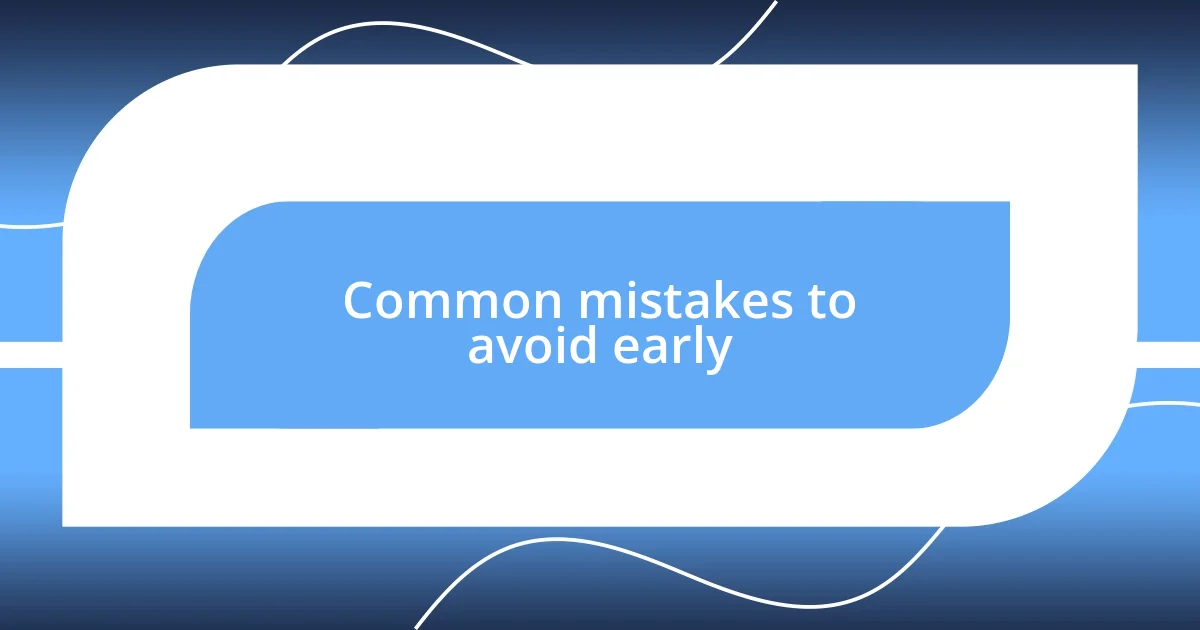
Common mistakes to avoid early
Understanding the common mistakes we make early on can dramatically shape our experience. One major error I encountered was rushing into decisions without adequate research. Early in my career, I eagerly accepted a role that sounded perfect but turned out to be misaligned with my values. Taking the time to thoroughly investigate both the role and the company culture would have saved me from unnecessary frustration. Have you ever jumped in too quickly only to regret it later?
Another mistake I see is not seeking feedback when it’s most crucial. I was hesitant to ask for guidance from mentors or peers, thinking I could figure everything out on my own. However, I learned that constructive criticism is a gift, and leveraging others’ experiences can elevate your work. I remember presenting a project that I thought was flawless only to discover significant oversights. What if I had asked for feedback beforehand?
Finally, many newcomers underestimate the power of networking. I often kept to myself, assuming my work would speak for itself. This limited my opportunities to collaborate and connect with others who could have supported my growth. Building genuine relationships early on opened doors I never knew existed. Have you considered how much networking could benefit your journey?
| Mistake | Impact |
|---|---|
| Rushing decisions | Misalignment with values, potential frustration |
| Ignoring feedback | Missed opportunities for improvement |
| Neglecting networking | Limited collaborations and growth opportunities |
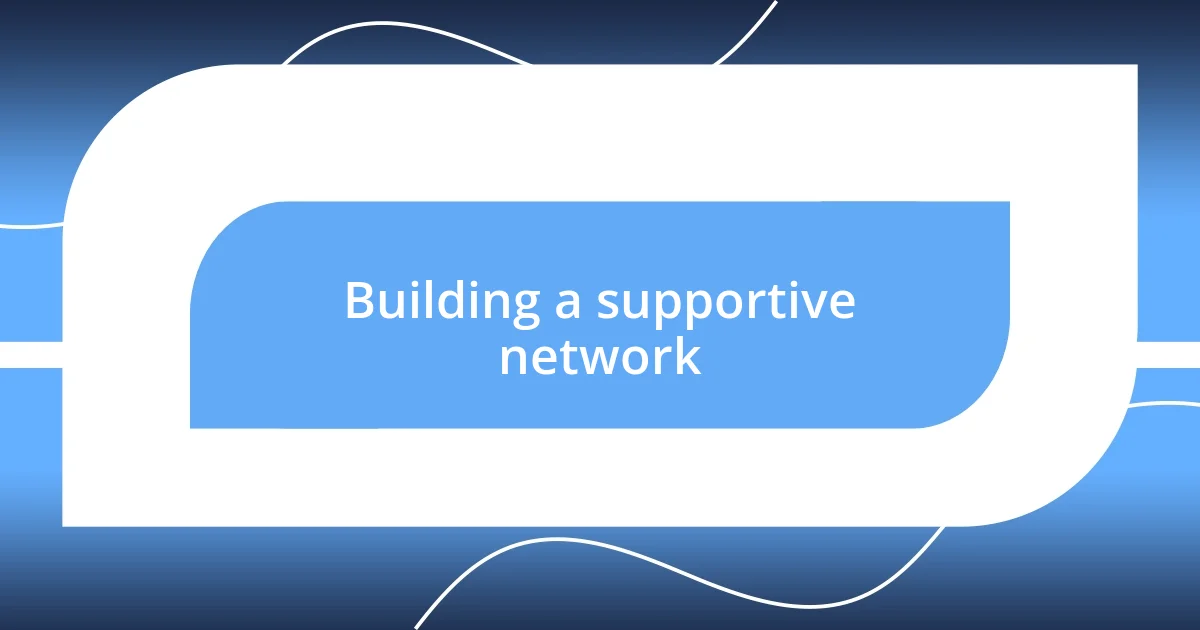
Building a supportive network
I wish someone had told me how vital it is to build a supportive network right from the start. Early on, I often felt isolated, thinking I had to go it alone. I remember attending a conference where I hesitated to introduce myself to others. It was intimidating, but when I finally gathered the courage to connect, I discovered a wealth of knowledge and support. Those connections not only provided guidance but also sparked collaborations that enriched my work in ways I never anticipated.
- Reach out to colleagues for coffee; genuine connections thrive over casual chats.
- Join local professional groups or online communities; shared interests create strong bonds.
- Volunteer for projects or committees; working alongside others fosters teamwork and trust.
I’ve learned that a supportive network is not just about your immediate team—it’s about cultivating relationships that foster growth. I recall reaching out to someone I admired for advice. Their willingness to share their journey and insights not only inspired me but also gave me valuable strategies for navigating challenges. Connecting with those who have different experiences and perspectives can truly broaden your understanding and open doors for future opportunities.
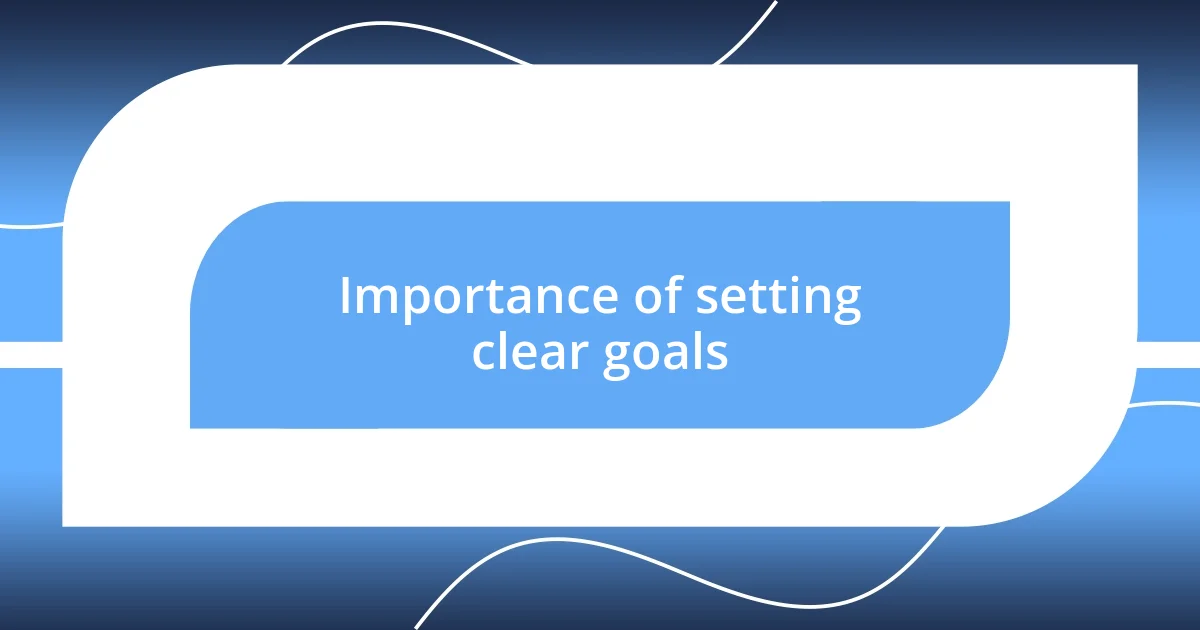
Importance of setting clear goals
Setting clear goals is like having a roadmap; without it, we’re just wandering. I remember when I first started, I was driven but lacked direction. I set vague ambitions like “I want to succeed” without defining what success meant for me. The frustration of feeling stuck taught me the hard way that specific, measurable goals lead to more focused efforts and greater achievement. Have you ever felt aimless in your pursuits? It’s not just about wanting to reach a destination; it’s about knowing exactly where you want to go.
Establishing clear goals also helps in maintaining motivation. I vividly recall a project that seemed daunting at first, and I started with a broad goal of “improving my skills.” As I broke it down into specific objectives—like mastering a particular software or finishing certain tasks by a deadline—I felt more energized. Every small victory became a stepping stone, fueling my momentum. What if you could transform overwhelming projects into manageable pieces? Clear goals can be your best ally in that journey.
Moreover, having defined goals creates accountability, both to yourself and others. When I finally articulated my goals to my peers, I sensed a shift. I felt compelled to show up and deliver, knowing others were aware of what I aimed to achieve. It was incredible how this accountability pushed me to go beyond my comfort zone. Have you considered how sharing your goals could amplify your progress? Embracing clear objectives turned out to be a game-changing experience for me, and it could be for you, too.
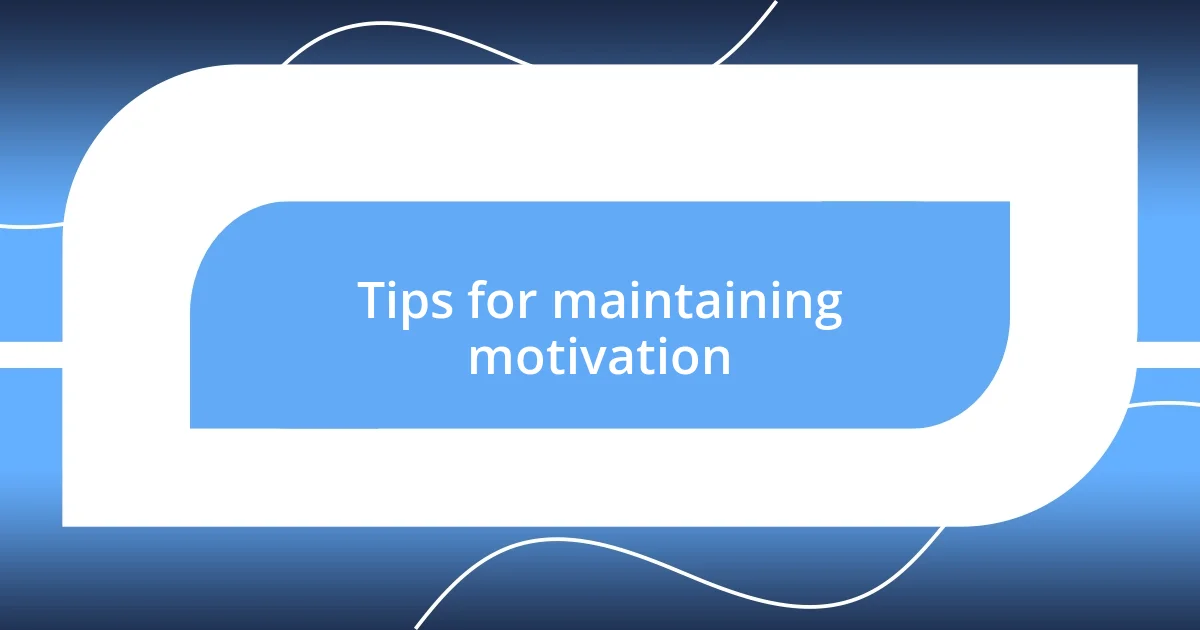
Tips for maintaining motivation
Staying motivated can be a challenge, especially during tough times. I learned a game-changing tip: celebrate small wins. Early in my career, I often overlooked the little accomplishments, thinking they weren’t significant. But when I started recognizing and celebrating these moments—like finishing a tough task or receiving positive feedback—I felt a renewed sense of energy. What if you took time each week to acknowledge your progress? You’d be amazed at how much this simple practice lifts your spirits and keeps you moving forward.
Another crucial aspect is surrounding yourself with positivity. I remember feeling drained after conversations with negative colleagues. The difference was palpable when I started spending time with more optimistic people. They fueled my passion and made challenges seem conquered rather than daunting. Have you considered the impact of your circle on your motivation? I found that choosing to engage with those who inspire and uplift not only kept my spirits high but also encouraged me to pursue my goals more fervently.
Lastly, remember the power of routines. I never realized how much a structured daily routine could boost my motivation until I established one. Initially, my mornings were chaotic, which set a disorganized tone for the day. When I implemented a simple routine—like a morning walk and a cup of tea while reviewing my goals—I felt an anchor. Do you think incorporating a routine could help enhance your focus? The rhythm of daily habits can create a stable environment that champions your motivation, making challenges less overwhelming and more manageable.
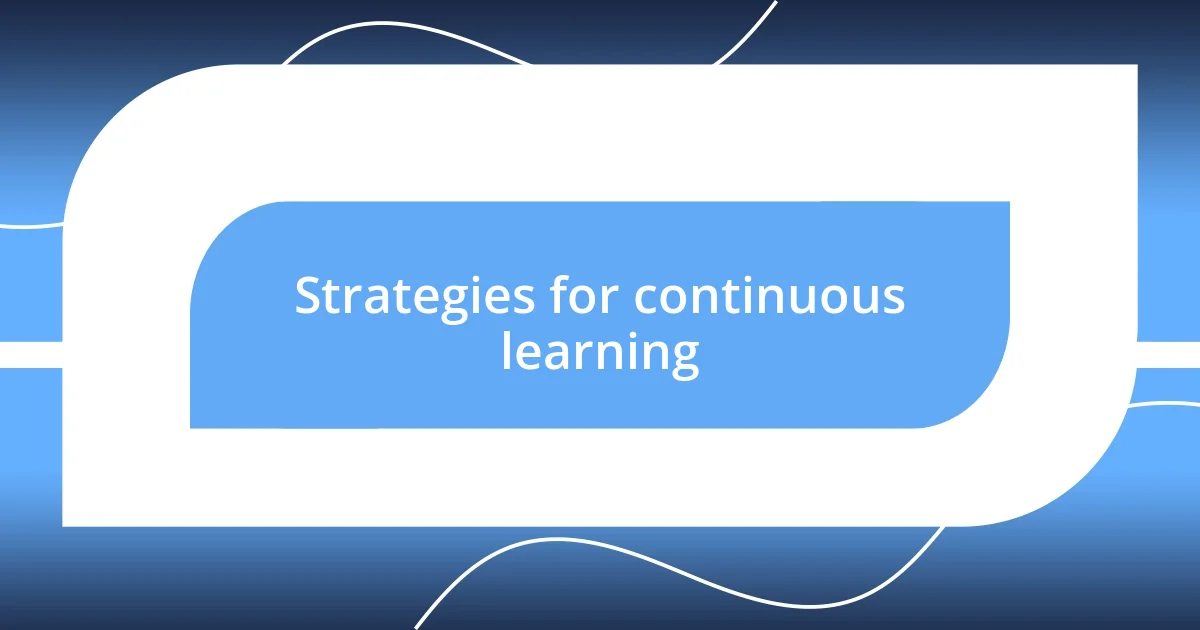
Strategies for continuous learning
Adopting a mindset of continuous learning is essential for personal and professional growth. I found that one of the most effective strategies is to commit to a daily practice of reading or exploring new topics. Early on, I set a goal to read at least one article or chapter every day. This small but consistent habit allowed me to absorb a wealth of knowledge over time. Have you tried dedicating just a few minutes each day to learning something new? You might be surprised at how those tiny increments can expand your horizons.
Another powerful approach is to seek feedback actively. When I first started, I hesitated to ask for input, fearing criticism. This mindset changed when I started to view feedback as a valuable gift rather than a setback. I remember one project where my mentor provided insight that completely altered my approach, ultimately leading to better outcomes. Do you think seeking feedback could help you refine your skills? Embracing perspectives from others can fast-track your learning process and deepen your understanding of various concepts.
Lastly, I’ve discovered that teaching others is an incredible way to leverage my own learning. When I began mentoring a colleague, I realized that explaining concepts helped solidify my own understanding in ways that just studying could not. The process of breaking down complex topics into digestible pieces for someone else challenged me to think critically. How often do you share your knowledge with others? Engaging in this reciprocal learning not only boosts your confidence but also opens doors to new insights and discussions.


